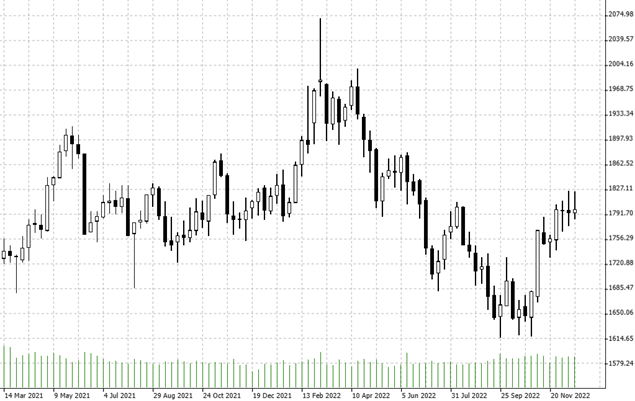

03.01.2023 – It’s all been done before: The world is threatened with recession. Nevertheless, the most important central banks are raising interest rates. The probable result: economic standstill, insolvencies, bad loans, tottering banks. Especially in Southern Europe.
As you will read in a moment, it is worthwhile for pessimists to take a look at the gold price. Because if our experts are right, the precious metal could soon be in demand again as a safe haven in a new financial crisis. Here is the weekly chart. It is indeed astonishing that gold recently became more expensive despite higher interest rates.

Source: Bernstein Bank GmbH
Alasdair Macleod of GoldMoney.com, has already spotted signs of a global banking crisis. Which is nothing out of the ordinary for a gold bull and enemy of paper money, but may be true nonetheless.
Banking crisis ahead
Macleod recently wrote this about his basic assumption: “there can only be one conclusion about the future course of interest rates. The trend has turned and after an initial rise have paused. This softening of the interest rate outlook will turn out to be temporary, to be followed by a continuing trend of yet higher rates, reflecting more aggressive currency debasement, awkwardly coinciding with a deepening slump in economic activity.”
And further: “Bank balance sheets are as overleveraged as they have ever been particularly in Europe and Japan. And with rising interest rates ensuring a bear market in financial assets and widespread exposure to malinvestments leading to non-performing loans, banker sentiment is swinging firmly toward risk containment.”
Liquidity drying up
The expert sees liquidity drying up, especially in the foreign exchange market, with derivatives such as swaps and forwards not realistically showing up on bank balance sheets. We add: If true, an extremely dangerous crisis is building under the radar. Further, Macleod judged, “As with all credit contractions, when and where the system will break is virtually impossible to predict. But when it happens, the crisis will be sudden. We must hope that the year-end financial window-dressing season passes without incident.”
Target2 again and again
And another interesting fact on the subject of the imminent implosion of the banks. Like a cork that a fool tries to push under water, one topic keeps popping up: The European Central Bank’s Target2 balances. The damning verdict from Mike Shedlock of MishTalk.com: capital flight is a key building block in this system. And further: “The ECB’s imbalance is related to its bond manipulation schemes to keep interest rates down in Italy, Spain, Greece, and the peripheral Eurozone countries in general.”
The background: solvent countries are buying bonds of their cash-strapped neighbors that can’t get their economies under control. For example, according to MishTalk, Germany’s most recent surplus was 1.2 trillion euros, and Luxembourg is also a big spender, with 303 billion. According to the report, the big deficits are in Italy (670 billion euros), Spain (484), the ECB itself (339) and Greece with 106 billion euros.
Shedlock further commented, “It’s increasing likely that corporations and wealthy individuals do not trust Italian banks, nor should they.” Which brings us to one of the likely flashpoints in a possible coming crisis: Italy. Our conclusion: The argumentation of the bears is quite stringent. So keep an eye on real-time news from the banking sector. And of course the gold chart.
__________________________________________________________________________________________
The content of this publication is for general information purposes only. In this context, it is neither an individual investment recommendation or advice nor an offer to purchase or sell securities or other financial products. The content in question and all the information contained therein do not in any way replace individual investor- or investment-oriented advice. No reliable forecast or indication for the future is possible with respect to any presentation or information on the present or past performance of the relevant underlying assets. All information and data presented in this publication are based on reliable sources. However, Bernstein Bank does not guarantee that the information and data contained in this publication is up-to-date, correct and complete. Securities traded on the financial markets are subject to price fluctuations. A contract for difference (CFD) is also a financial instrument with leverage effect. Against this backdrop, CFD trading involves a high risk up to the point of total loss and may not be suitable for all investors. Therefore, make sure that you have fully understood all the correlating risks. If necessary, ask for independent advice. CFDs are complex instruments and are associated with the high risk of losing money quickly because of the leverage effect. 68% of retail investor accounts lose money trading CFD with this provider. You should consider whether you understand how CFD work and whether you can afford to take the high risk of losing your money.7
